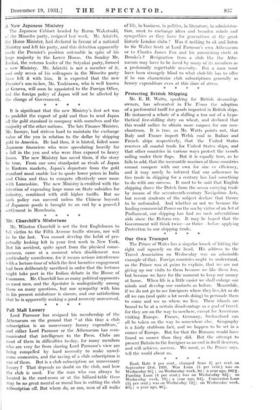Protecting British Shipping Mr. E. H. Watts, speaking for British
steamship. owners, has advocated in The Times the adoption of a preferential tariff for goods imported in British ships. He instanced a rebate of a shilling a ton out of a hypo- thetical five-shilling duty on wheat, and declared that this would suffice to obtain more cargoes for our mer- chantmen. It is true, as Mr. Watts points out, that Italy and France import Welsh coal in Italian and French ships respectively, that the United States reserves all coastal trade for United States ships, and that other countries in various ways protect the vessels sailing under their flags. But it is equally true, as he fails to add, that the mercantile marines of those countries cannot compare with our own for size or efficiency, and it may surely be inferred that our adherence to free trade in shipping for a century has had something to do with our success. It used to be said that English shipping drove the Butch from the ocean carrying trade by means of the seventeenth-century Navigation Acts, but recent students of the subject declare that theory to be unfounded. And whether or not we became the leading commercial Power on the sea by virtue of an Act of Parliament, our shipping has had no such adventitious aids since the Reform era. It may be hoped that the Government will think twice—or thrice--before applying Protection to our shipping trade.


































 Previous page
Previous page